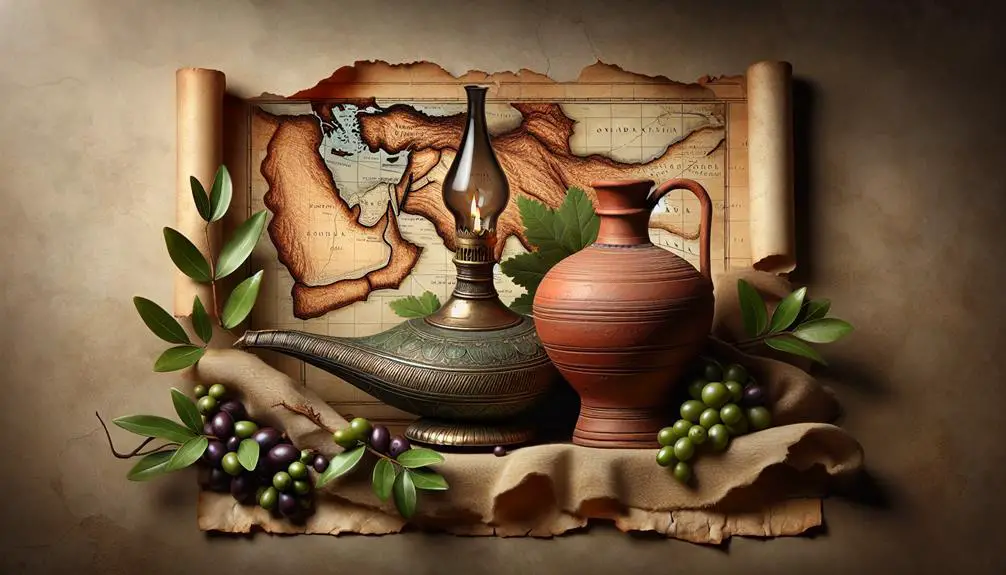Learn how oil and wine are not just Biblical staples, but symbols with deep spiritual significance that continue to resonate today.

Oil and Wine in the Bible
As you navigate through the tapestry of biblical narratives, you'll find that oil and wine are more than mere commodities; they are threads woven into the very fabric of spiritual and daily life.
These elements carry a historical weight and symbolic significance that have rippled through time, influencing rituals, healing practices, celebrations, and anointing traditions.
Whether it's the oil that anoints kings or the wine that symbolizes joy and festivity, you're standing at the threshold of understanding how these substances have shaped not only ancient customs but also modern interpretations.
Uncover why these symbols have stood the test of time and how their relevance continues to evolve in today's context.
Key Takeaways
- Oil and wine symbolize divine blessing and humanity's deep connection with the land in the Bible.
- Biblical texts attribute healing and purifying powers to both oil and wine.
- Oil and wine are central to religious rituals, symbolizing joy, prosperity, and consecration.
- The production and use of oil and wine in biblical times fostered economic and cultural exchanges.
Historical Significance

Throughout history, oil and wine haven't only sustained societies but also played pivotal roles in religious rituals and economic development, revealing their profound significance in the tapestry of human civilization. These substances, deeply embedded in the agricultural practices of ancient communities, were more than mere commodities; they were the lifeblood of economies and social structures.
You'll find that the cultivation and processing of olives and grapes required sophisticated agricultural techniques, signaling a move towards more settled, agrarian societies. This shift wasn't just about growing food; it was a foundational change in how communities organized themselves, interacted with the environment, and conceived their economic futures. The production of oil and wine necessitated a long-term investment in the land and its care, fostering a deep connection between people, their livelihoods, and the earth.
The economic impact of oil and wine production in historical periods can't be overstated. These goods served not only as essential dietary staples but also as trade commodities that connected different regions and cultures. Their value on the market could sustain economies, fund the construction of cities, and even finance wars. In essence, oil and wine were early drivers of globalization, facilitating economic interdependence and cultural exchange long before the term existed.
As you delve deeper into the historical significance of oil and wine, you'll uncover a narrative that intertwines agricultural ingenuity with economic foresight. These elements, when combined, illustrate the transformative power of these commodities in shaping human history.
Symbolic Meanings

Beyond their economic and agricultural significance, oil and wine also hold profound symbolic meanings in various cultures and religious practices, shaping narratives and beliefs that transcend time. These substances aren't merely products of the earth but are seen as divine gifts, emblematic of the intertwining between human endeavor and celestial benevolence. Their roles in ancient texts and traditions reveal layers of interpretation and significance that enrich our understanding of their place in the human story.
- Divine Gifts: Both oil and wine are often depicted as gifts from the gods or the divine, symbolizing favor and blessing. Their mention in sacred texts underscores their importance, not just for physical sustenance but also for spiritual well-being.
- Agricultural Importance: The cultivation of olives and grapes, necessary for producing oil and wine, respectively, reflects humanity's connection to the land. These products stand as testaments to the agricultural ingenuity and labor of ancient peoples, embodying the fruitfulness of the earth when nurtured with care.
- Symbol of Joy and Prosperity: Wine, in particular, has been a symbol of joy, celebration, and prosperity throughout history. Its presence at feasts and important occasions underscores its role in fostering community and happiness.
- Anointing and Healing: Oil, on the other hand, symbolizes purification, healing, and consecration. Its use in religious ceremonies for anointing sets it apart as a medium for divine grace and protection.
Through these symbols, oil and wine encapsulate a rich tapestry of meanings, intertwining the divine with the earthly, and highlighting the sacredness imbued in the fruits of human labor.
Ritualistic Uses

Oil and wine's ritualistic applications extend deep into the fabric of religious and cultural ceremonies, illustrating their multifaceted roles as conduits of the sacred. These substances aren't merely products of agricultural practices; they're imbued with a profound spiritual significance, serving as symbols of prosperity, joy, and divine blessing. Their use in rituals reflects a deep connection between the material and the spiritual, where the act of offering or using them transcends the physical to touch the divine.
Within the historical contexts of the Bible, you find that oil, especially olive oil, was pivotal in ceremonies of anointing. Kings, priests, and prophets were anointed as a sign of their sacred appointment and dedication to God. This act wasn't simply symbolic; it was a physical manifestation of ceremonial purity, setting apart the anointed as holy unto the Lord. Similarly, wine played a crucial role in religious feasts and offerings. It was poured out as a libation, an act of worship acknowledging God's sovereignty and expressing gratitude for His bountiful provision.
These ritualistic uses of oil and wine underscore their value not just as agricultural commodities but as essential elements in the spiritual life of the community. They symbolize the intertwining of human labor with divine blessing, where the fruits of the earth, cultivated through human effort, become mediums of spiritual communication and expression.
In analyzing these practices, it's clear that oil and wine served not only in physical sustenance but also as pivotal elements in maintaining ceremonial purity and upholding the sacred traditions that define and enrich the spiritual identity of a community.
Healing Powers

You'll discover that oil and wine, beyond their mundane uses, hold profound healing capacities within biblical texts. These substances aren't merely physical remedies but are imbued with symbolic meanings that transcend their immediate applications.
Biblical Remedies Explored
Delving into biblical remedies, one discovers that ancient texts attribute healing powers to both oil and wine, suggesting a profound understanding of their therapeutic benefits. These substances weren't merely dietary staples but integral to ancient recipes and cultural practices for maintaining health and treating ailments.
- Ancient recipes often combined oil and wine with herbs, creating potent remedies for various conditions.
- Cultural practices included the use of oil in anointing and wine in purification rituals, highlighting their perceived medicinal properties.
- Antiseptic qualities of wine were utilized for cleaning wounds, showcasing an early grasp of infection control.
- Oil's soothing properties offered relief for skin conditions and aches, evidencing its role in ancient therapeutic practices.
This exploration reveals a sophisticated approach to healing, deeply embedded in the fabric of biblical times.
Symbolic Meanings Unveiled
Building on the practical applications of oil and wine in biblical remedies, it's imperative to explore their deep-seated symbolic meanings, particularly in the context of healing powers, to fully grasp their significance in ancient texts. These substances weren't just physical treatments but were imbued with layers of spiritual and emotional healing attributes, reflecting the intertwining of agricultural impacts and cultural influences in ancient societies.
Oil, often a symbol of anointment and divine blessing, alongside wine, representing joy and celebration, played pivotal roles in rituals and ceremonies, underlining their healing connotations. Through this lens, you'll appreciate how these elements transcended their immediate utility, embodying a holistic approach to healing that resonated deeply within the cultural ethos of the time.
Celebratory Roles

In biblical times, oil and wine served as central elements in celebrations, symbolizing joy and prosperity. These substances weren't merely consumed; they were deeply woven into the fabric of societal rituals and religious observances, highlighting their importance beyond mere sustenance.
Feasting customs often featured oil and wine prominently. Olive oil was used not only for cooking but also for anointing guests, signifying honor and celebration. Wine, derived from the numerous vineyard stories scattered throughout biblical texts, was a symbol of abundance and divine blessing. These narratives underscore wine's role in communal joy, often marking significant religious and social milestones.
- Feasting Customs: Olive oil was a staple in cooking and was used to anoint guests, enhancing the festive atmosphere.
- Vineyard Stories: Biblical tales frequently reference vineyards, associating wine with divine favor and communal celebration.
- Symbol of Prosperity: Both oil and wine were indicators of economic stability and were used to express generosity and hospitality.
- Communal Joy: Celebrations featuring these elements fostered a sense of community and shared happiness, reinforcing social bonds.
Through this analytical lens, it's clear that oil and wine's celebratory roles in the Bible transcend their physical properties. They were emblematic of joy, prosperity, and community, deeply integrated into the fabric of biblical society. This integrative approach to feasting customs and vineyard stories reveals how these elements facilitated communal bonds and underscored significant life events, making them indispensable in biblical celebrations.
Anointing Traditions

Exploring the anointing traditions within biblical narratives, you'll find that oil's significance extends beyond culinary uses, serving as a profound symbol of sanctification and honor. This tradition, deeply embedded in the fabric of ancient practices, reveals the multifaceted roles oil played in religious ceremonies and its intrinsic value in consecrating individuals and ceremonial objects.
Anointing with oil was a ritual act of pouring oil on someone or something as a way of consecration, a practice that signified the setting apart for a divine purpose. Kings, prophets, and priests were anointed as a sign of their special roles and God's favor. This act wasn't merely symbolic but was believed to imbue the anointed with the Holy Spirit's presence, empowering them for their sacred duties. The oil used in these ceremonies wasn't ordinary but was often a specific blend described in Exodus, imbued with myrrh, cinnamon, and other spices, underlining its sacredness.
Priestly garments, too, were subjects of anointing, transforming them from mere fabric to sacred attire. This anointing sanctified the garments, making them fit for service in the temple and setting the priests apart from the lay community. The oil symbolized purity, its fragrance a constant reminder of the priest's consecrated life.
The anointing traditions underscore the deep intersection between the material and the spiritual in biblical texts. Oil, a common substance, was elevated to a medium of divine grace and favor, marking individuals and objects as participants in the sacred narrative. Through these acts, the community acknowledged the divine order and their place within it, embracing the tangible connection to their faith and God.
Modern Interpretations

Reflecting on the ancient anointing traditions, it's crucial to understand how contemporary interpretations of oil and wine in biblical contexts have evolved, revealing their enduring significance in modern spiritual practices. In today's world, these substances have transcended their original sacred uses, integrating into various aspects of life while retaining a spiritual resonance for many.
- Culinary Uses: Oil and wine have found profound roles in culinary traditions worldwide, symbolizing not only sustenance but also the celebration of life and community. These uses echo biblical motifs of nourishment and joy, bridging ancient customs with modern dining experiences.
- Environmental Impact: The production and consumption of oil and wine today raise critical questions about stewardship of the Earth, reflecting biblical themes of care and respect for creation. Modern discussions often center on sustainable practices, emphasizing the need for balance between enjoying these gifts and preserving the environment.
- Spiritual Symbolism: In religious rituals, oil and wine continue to symbolize purification, healing, and consecration, drawing direct lines to biblical precedents. This enduring symbolism underscores their unbroken relevance in contemporary faith traditions.
- Cultural Adaptations: Across cultures, the interpretation of oil and wine has diversified, reflecting localized beliefs while maintaining a thread of shared spiritual heritage. This adaptation demonstrates the fluidity of biblical symbols, capable of evolving meanings while preserving core values.
Analyzing these aspects offers insights into how oil and wine maintain their spiritual, cultural, and ecological significance from biblical times to the present, highlighting their multifaceted roles in modern society.
Frequently Asked Questions
How Do Contemporary Environmental Concerns Impact the Traditional Biblical Practices of Oil and Wine Production?
You're facing an era where modern biotechnology and ethical consumption greatly influence traditional practices. The production of oil and wine, while steeped in history, now confronts environmental challenges that demand sustainable approaches.
Biotechnology offers solutions but also raises questions about naturalness and authenticity. Ethical consumption pushes for practices that respect the environment and societal values, reshaping how these ancient products are produced, valued, and consumed in today's world.
Can the Methods of Oil and Wine Production Mentioned in the Bible Inform Sustainable Agricultural Practices Today?
You're exploring whether ancient practices of oil and wine production can guide sustainable agriculture today.
Ancient fermentation techniques and olive grafting methods, deeply rooted in history, offer a blueprint for eco-friendly practices. These traditional approaches minimize waste and enhance biodiversity, aligning with modern sustainability goals.
How Have the Varieties of Grapes and Olives Mentioned in the Bible Evolved Over Time Due to Climate Change and Agricultural Innovation?
You're exploring how grape genetics and olive cultivation have evolved due to climate change and agricultural innovation. Over centuries, genetic modifications and cultivation techniques have adapted to shifting climates, enhancing the resilience and quality of these plants.
Innovations in agriculture have also played a pivotal role, leading to varieties better suited for modern environmental conditions. This evolution underscores the importance of sustainable practices in responding to environmental challenges, ensuring the long-term viability of these crops.
In What Ways Have Non-Religious Communities Adopted or Adapted Biblical References to Oil and Wine in Their Cultural Practices?
You've seen cultural symbolism and artistic inspiration drawn from oil and wine in various non-religious communities. These elements, rich in history, have transcended their biblical origins. They're now symbols of celebration, creativity, and even protest in diverse cultural practices.
Whether it's through culinary traditions, visual arts, or social rituals, oil and wine have been adapted to reflect contemporary values and identities, showcasing their enduring influence beyond religious texts.
Are There Any Recorded Instances Where the Misuse of Oil and Wine in Biblical Times Led to Societal or Environmental Consequences?
You're exploring whether the misuse of substances like oil and wine historically led to negative outcomes.
While detailed records are scarce, evidence suggests that excessive use could have had health implications and disrupted ceremonial uses, impacting societal harmony and environmental balance.
Scholars infer these consequences from analyzing artifacts and texts, indicating that even in ancient times, the importance of moderation was recognized to prevent detrimental effects on communities and their surroundings.
Conclusion
In conclusion, your exploration into oil and wine in the Bible unveils their profound layers beyond mere sustenance. Symbolically rich and ritually significant, these elements have shaped spiritual and cultural practices for millennia.
Intriguingly, over 200 references to wine and oil are found within the biblical texts, highlighting their integral role in ancient societies. This statistic not only captivates but also underscores the enduring legacy of these substances, inviting a deeper appreciation of their historical, symbolic, and ritualistic dimensions in a modern context.



Sign up